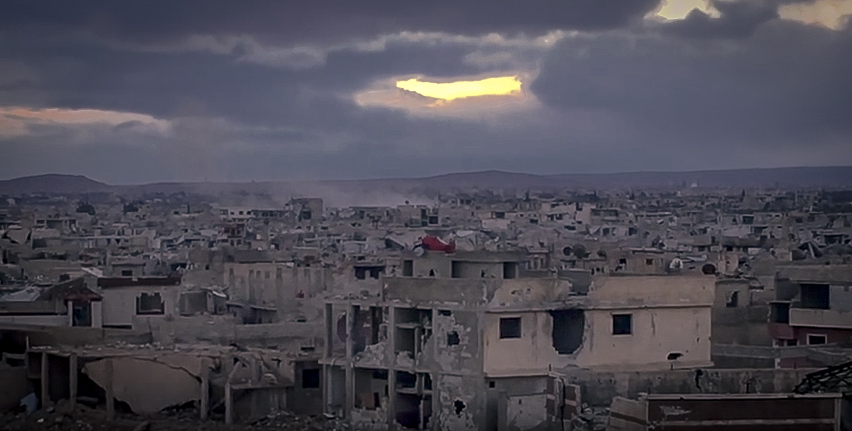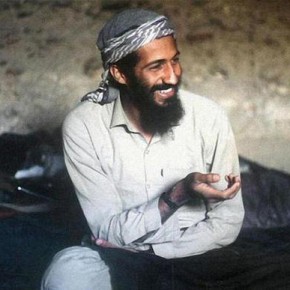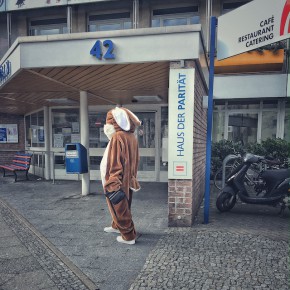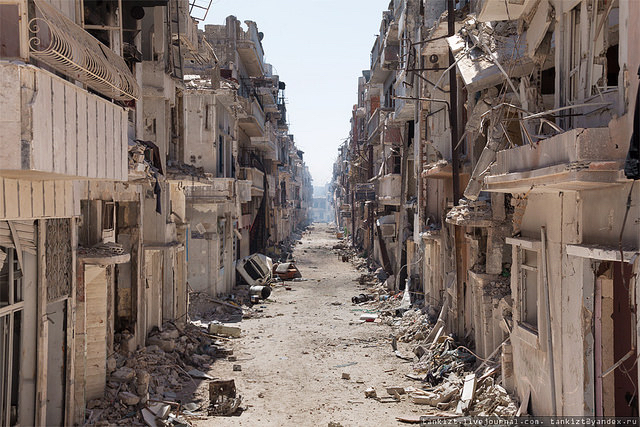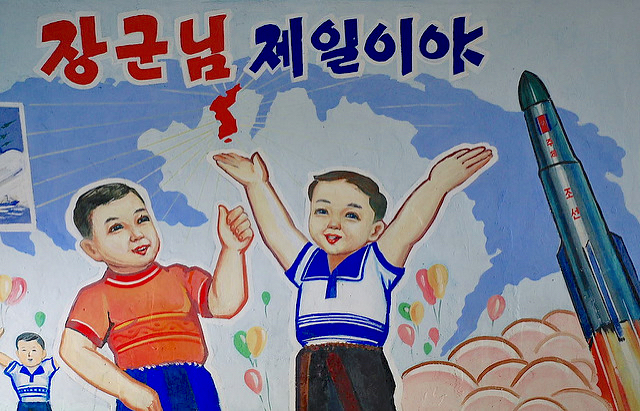Journalist Rahaf Haboub grew up in Daraya, a Damascus suburb besieged by pro-government forces for more than three years. She and her family fled in fall 2012 after the government targeted the area with airstrikes and barrel bombs – these are her recollections of those harrowing times.
My sister’s loud, shuddered breathing kept me awake that night. I tried to ignore it, but couldn’t. I recalled a novel I’d read long ago titled, “The Pains of Mr. Marouf.” The protagonist repeatedly tries to change the course of his thoughts. “The subject — change the subject,” he repeats to himself. I tried to change the subject too, but I failed.
11/18/2012
I was cold. My fingers were almost frozen. I tried to warm my hands by blowing into them while waiting in the car. Each one of us was in charge of a few bags filled with food and clothes. They had agreed on a one-hour cease-fire to allow civilians to leave Daraya. That was after the regime’s first airstrikes on the area.
We, as a family, had decided not to leave because we thought that leaving represented defeat. It was a particularly sensitive issue for us because we had been active in protests and in distributing anti-regime flyers. However, as soon as the first aircraft attacked, everything changed. The sound was louder than the sound of our logic and our principles. My little brothers – Nour and Abdul Hadi – lost their color. Together, we hid in the bathroom for 20 minutes. Every time the aircraft shelled the area, my mother’s prayers got louder, asking God to keep us safe.
We tried to ignore the sounds of the explosions, but they were too loud, and by the time the attack ended, we were all extremely scared, clinging to each other in our little bathroom. My brothers’ faces had turned white with fear. I expected them to cry, but they did not. They were silent with blue circles around their eyes. My mother looked into my father’s eyes and said, “We should leave for the sake of the kids.” We refused at the beginning, but the situation was too hard for my little brothers. We decided that my mother was right, and that we should leave in order to protect the young ones from physical injury and psychological trauma.
We walked quickly. We didn’t even look back to see what happened to our home. We had never imagined that it would end like this. We had never imagined that rockets and bombs would dictate our future. We didn’t even say goodbye to the house. I remember very well that, while waiting for my father in the car, I looked at our neighbor’s house but not at ours. What was I thinking?
It was the beginning of the day, around dawn. It had been a very long and slow night, waiting for the sun to rise so that we could find our way out. When we arrived in the neighboring area of Jdeidat Artouz, we sat in the car while my father looked for a place for us to stay – a house, an apartment, or even a room for rent. Waiting in the car was tiring, but at least we were in a warm place, and every time we needed to go to the restroom, we would go and buy something from a shop and use the restroom there. My mother jokingly asked us to drink fewer fluids because using the restrooms was becoming really costly. She hid her shaking lips and pretended to be strong. We had a long road ahead of us. She didn’t know how it would end, but she knew she could not afford to fall apart at that point. Eventually, my father found us a house, a one-bedroom. We arrived with all of our bags, which we later discovered was useless.
The owner of the house showed sympathy, giving us blankets and mattresses. When my mother looked at the blankets, she couldn’t hold herself together anymore. She cried and cried until she had expended all of her remaining energy as we sat there watching her go into shock. My father brought us some shawarma sandwiches because my brothers love them. We all ate silently.
Night came, and it was bedtime. My parents didn’t know what to do. There were eight of us, and only enough blankets and mattresses for six. They pretended that they weren’t sleepy, and that they wanted to stay up.
https://www.youtube.com/watch?v=uH-7gImkM6o
The place was tight. We all slept bunched together, barely able to move. It had been a long time since I had been that physically close to somebody. My sister had a cold, and she had spent hours in the bathroom crying, her breath hard and loud. I was lying down on my side, unable to move. All I was thinking about was how to block out the sound of her sobbing. I could hear my parents hurriedly whispering. In my head I kept repeating: “The subject. Change the subject.” I didn’t want to look uncomfortable because I didn’t want to hurt my parents. I told myself that I would eventually fall asleep, but I could not. I stuck my head out from under the blanket I had used to cover my face and looked around. It was a foreign place — there was an old clock on the wall, and a picture of an old man. I thought perhaps he was the apartment owner’s father. She had the same eyes. The place was empty except for a little table with an old TV. My parents sat on little cushions, watching the news and whispering, but most of the time they were just silent.
My parents looked at me, but we didn’t say anything to each other. We barely talked that day. It felt like we had been through something long and painful … like we had lost a part of our soul, and needed time to comprehend what had happened. After a long silence, or maybe it was short — I do not remember — I said, “Coffee?” They smiled and said, “Why not, it’s still early.”
Standing in a kitchen that I didn’t know, I waited for the water to boil so that I could add the coffee. I looked at the moon from the window and I thought of words written by the well-known Syrian Kurdish writer Salim Barakat: “I wish I could smell the moon … ” And I wish I could find a place in which there were no blue circles around my brothers’ eyes; a world where my parents could sleep without the need to take turns; a world in which there was no picture of a strange old man watching me while I was trying to sleep, asking me what I was doing there in his daughter’s house.
https://www.youtube.com/watch?v=Xr925s7DQP4
This article originally appeared on Syria Deeply, and you can find the original here. For important news about the war in Syria, you can sign up to the Syria Deeply email list.
Documentary still courtesy of Alexander Pushin. All rights reserved.
